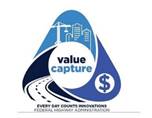
Federal Highway Administration (FHWA) EDC5: Value Capture
Dates: November 12-13, 2019
Exchange Host: Nevada DOT and Utah DOT
Exchange Location: Lloyd D. George Federal Courthouse, 333 South Las Vegas Boulevard, Las Vegas, NV 89101 Conference rooms 2 and 3
Length of Exchange: 1.5 days (starting on afternoon of day 1 and full day on day 2)
Objectives: This customized exchange provides an opportunity for Nevada and Utah to learn about value capture techniques that can be used to accelerate project delivery and reduce costs. The peer exchange offers a forum for leading states and locals from selected transportation officials to exchange ideas and best practices and identify common challenges and opportunities in major focus areas:
Information on FHWA's EDC5 value capture effort can be found at: https://www.fhwa.dot.gov/innovation/everydaycounts/edc_5/value_capture.cfm.
Format:
Format:
Value Capture Presenters:
Moderator: Rick Rybeck, Director at Just Economics, LLC
Day 1:
| Time | Topic | Lead Presenter |
|---|---|---|
|
1:00 – 1:20 pm |
Welcome from Hosts
|
FHWA Nevada Division FHWA Utah Division Thay Bishop, FHWA EDC5 Team lead |
|
1:20 – 1:30 pm |
Participant Introductions Participants will introduce themselves and highlight an area of expertise and what experiences they want to draw from this peer exchange. |
|
|
1:30 – 2:00 pm |
Overview of value capture techniques and Nevada and Utah overview of peer exchanges objective and desired outcomes Identification by participants of potential projects in Nevada and Utah that might consider value capture techniques. Presentation:
|
Thay Bishop, FHWA NVDOT representative |
|
2:00 – 3:00 pm |
Value Capture Techniques and Facilitated Discussion Presentation and overview of value capture techniques with a focus on techniques that are well suited to Nevada and Utah. Discussion from participants about their interests in value capture techniques. Presentation:
|
Rick Rybeck, SME |
|
3:00 – 3:15 pm |
Break |
|
|
3:15 – 4:30 pm |
Value Capture: Tax Increment Financing and Transportation Reinvestment Zones, and Business Improvement Districts Transportation Reinvestment Zone Presentation & discussion about how these are not a “zero sum game” technique
Presentations:
|
Rick Rybeck, SME Rafael Aldrete, TTI |
|
4:30 – 5:00 pm |
Wrap up and charge for Day 2 |
|
|
End of day 1 |
Day 2:
| Time | Topic | Lead Presenter |
|---|---|---|
|
8:30 – 8:50 am |
Welcome and Overview of the Day Facilitator welcomes attendees, reviews the key take away from Day 1 and provides context for Day 2 |
Facilitator |
|
8:50 – 9:45 am |
Identification of projects in Nevada and Utah with potential value capture usages Discussion of projects that may be suitable to incorporate value capture techniques and discussion with peers about potential and feasibility
|
Nevada DOT representative Utah DOT representative |
|
9:45 – 10:45 am |
Developer Contributions (Impact fees, negotiated exactions)
Presentations:
|
Rick Rybeck, SME Julie Masterpool, RTC |
|
10:45 – 11:00 am |
Break |
|
|
11:00 am – 12:15 pm |
Value Capture: Joint Development including use of telecommunications utility infrastructure
Presentations:
|
Rick Rybeck, SME Joshua Switzky, San Francisco Planning Department |
|
12:15 – 1:00 pm |
Lunch |
|
|
1:00 – 3:00 pm |
Value Capture: Joint Development continued
Presentations:
|
Rick Rybeck, SME Gary Carter, City of Santa Monica Thay Bishop, FHWA |
|
3:00 – 3:15 pm |
Break |
|
|
3:15 – 4:15 pm |
Discussion, Identification of Key Take Away, and Next Steps
|
Facilitator Rick Rybeck, SME |
|
4:15 – 4:30 pm |
Wrap-up & Follow-up Actions |
Facilitator |
|
4:30 pm |
Adjourn |
| Category | Technique | Definition |
|---|---|---|
Developer Contributions |
Impact Fees |
Fees imposed on developers to help fund additional public services, infrastructure, or transportation facilities required due to the new development. |
Negotiated Exactions |
Negotiated charges imposed on developers to mitigate the cost of public services or infrastructure required as a result of the new development. |
|
Transportation Utility Fees |
Transportation Utility Fees |
Fees paid by property owners or building occupants to a municipality based on estimated use of the transportation system. |
Special Taxes and Fees |
Special Assessment Districts |
Fees charged on property owners within a designated district whose properties are the primary beneficiaries of an infrastructure improvement. |
Business Improvement Districts |
Fees or levies charged on businesses within a designated district to fund or finance projects or services within the district's boundaries. |
|
Land Value Taxes |
Split tax rates, where a higher tax rate is imposed on land than on buildings. |
|
Sales Tax Districts |
Additional sales taxes levied on all transactions or purchases in a designated area that benefits from an infrastructure improvement. |
|
Tax Increment Financing |
Tax Increment Financing |
Charges that capture incremental property tax value increases from an investment in a designated district to fund or finance the investment. |
Joint Development |
At-grade Joint Development |
Projects that occur within the existing development rights of a transportation project. |
Above-grade Joint Development |
Projects that involve the transfer of air rights, which are development rights above or below transportation infrastructure. |
|
Utility Joint Development |
Projects that take advantage of the synergies of broadband and other utilities with highway right-of-way. |
|
Naming Rights |
Naming Rights |
A transaction that involves an agency selling the rights to name infrastructure to a private company. |